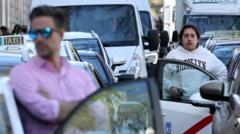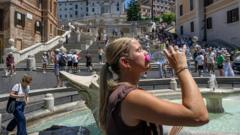**The power outage, affecting Spain, Portugal, and adjoining regions, led to a rapid deterioration of essential services and posed major challenges for citizens and tourists alike.**
**Massive Power Outage in Spain and Portugal Causes Widespread Disruption**

**Massive Power Outage in Spain and Portugal Causes Widespread Disruption**
**Chaos ensues across the Iberian Peninsula as a significant power cut leaves thousands stranded and businesses unable to operate.**
An unprecedented power outage struck Spain and Portugal around midday local time, resulting in a cascade of chaos that rippled through various sectors. The incident left many individuals stranded, disrupting transport networks and daily activities across both nations.
Peter Hughes, traveling to Madrid, suddenly found his train slowing before losing power entirely. Stuck 200 kilometers outside the capital, he had access to food and water, but the impaired toilet facilities led to rising anxiety about their predicament. "It will be getting dark soon and we could be stuck here for hours," he voiced during an interview with BBC.
The multifaceted power cut not only left passengers stranded on trains but affected traffic systems, commuter services, and retail establishments. Jonathan Emery was aboard a train between Seville and Madrid when the outage occurred, recalling a tense hour before passengers finally managed to pry open the doors. Local villagers soon arrived, offering water and food in a show of community spirit, which Emery captured as "nobody is charging for anything."
In Madrid, Hannah Lowney's grocery shopping at a supermarket was abruptly interrupted. "People were rushing out of their offices, not able to rely on public transport," she reported, highlighting the uncertainty that gripped the city. Mark England, meanwhile, experienced isolation at a Benidorm restaurant as the power failure triggered fire alarms and sealed off exits.
Reports from Lisbon indicate that schools also felt the outage's impact, with teachers, such as Emily Thorowgood, continuing classes in darkness while parents hurried to collect their children. The outage created widespread concerns as mobile phone networks became unstable, leaving many scrambling for information about the unfolding crisis.
Fear for food supplies and power retention began emerging as citizens sought to locate petrol stations that could still operate. Lesley, a long-time resident of Spain, expressed worries about essential items running low as the city grappled with a blackout that had left "very little news about what happened." As the situation unfolded and shops shuttered, locals found themselves navigating roads under free-for-all traffic conditions due to non-functioning traffic lights.
As hours passed, Red Electrica, Spain's power grid operator, began to restore electricity, although the mayor of Madrid advised citizens to limit movements to ensure safety. By 15:00 local time, Prime Minister Pedro Sanchez convened an extraordinary security council meeting to address the crisis. In contrast, Portugal's power company suggested that the total restoration of services could take as long as a week.
With back-up generators providing minimal relief, many remained in limbo, unsure of their next steps. Tom McGilloway, a visitor in Lisbon, faced uncertainty about returning to London due to potential flight cancellations and the crisis affecting payment systems. Widespread concern lingered among citizens and tourists alike, who questioned their ability to find accommodations or transport amidst the unfolding chaos.
As the situation continues to develop, the emphasis on community support and cooperation has emerged as a silver lining amid the turmoil that enveloped millions across the Iberian Peninsula.





















